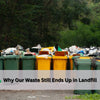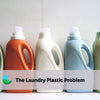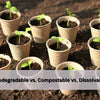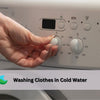How to Wash Baby Clothes for Newborns: Essential Tips for Your Little One
- by Brodie Cook

Welcoming a newborn into your life is one of the most exciting things. But it comes with many new tasks - like washing tiny clothes. Babies have sensitive skin, so it's important to clean their clothes the right way. This means using gentle detergents and washing methods to keep your baby comfortable and free from skin irritation.
Let's talk about how to wash baby clothes safely and effectively. We'll cover everything from choosing the right detergent to handling those tough baby stains. Whether you're a first-time parent or just looking for some helpful tips, you'll find what you need to keep your little one's clothes clean, soft, and safe for their delicate skin.
Why Should I Pre-Wash Baby Clothes?
Pre-washing baby clothes is important for your newborn's health and comfort. New clothes often have chemicals from the factory or store that can irritate a baby's sensitive skin. Even hand-me-downs might have dust or germs from storage. Washing baby clothes for the first time, before use removes these irritants and makes the clothes softer and safer for the first wear.
It's best to pre-wash all new baby items, including clothes, blankets, and stuffed toys, using a gentle, baby-friendly detergent. This simple step helps protect your baby's delicate skin from rashes and discomfort.
What's the Best Detergent for Baby Clothes?
When washing your little one's clothes, choose a detergent that's gentle and made for babies. These detergents are usually free from harsh chemicals, strong fragrances, and dyes that might irritate your baby's skin. A good baby detergent should be hypoallergenic, meaning it's less likely to cause allergic reactions.
Some key things to look for in a baby detergent are:
- Fragrance-free
- Dye-free
- Hypoallergenic
- Free from chlorine, phosphates, and optical brighteners
It's best to avoid fabric softeners when washing baby clothes. They can leave a residue that might irritate your baby's skin and can reduce the flame-resistant properties of some baby clothes. If you want to keep clothes soft, try using a gentle wash cycle and air-drying instead.
Remember, what works for one baby might not work for another. If you notice any signs of skin irritation after using a certain detergent, try switching to a different brand or consult your pediatrician for advice.
Try Lucent Globe Detergent Sheets for Gentle
Looking for a detergent that checks all the boxes for your baby's laundry needs? Consider trying Lucent Globe detergent sheets. These innovative sheets are pre-measured for easy use, and hypoallergenic - perfect for your baby's sensitive skin. Experience the convenience and gentleness of Lucent Globe detergent sheets for yourself. Click here to learn more and try Lucent Globe detergent sheets today!
How Often Should I Wash Baby Clothes?
How often you wash baby clothes depends on how quickly they get dirty and how many clothes your baby has. Babies can be messy with spit-up, diaper leaks, and food spills, so some items might need washing after each use. Generally, clothes that comes into contact with your baby's skin directly, like onesies and pyjamas, need to be washed after 1-2 wears. If your baby has already made an oopsie that soiled the clothes, wash them straight away.
You can choose between two main approaches:
- Small, frequent loads or weekly batching. Small, frequent loads (every 2-3 days) help prevent large pile-ups and ensure you always have clean clothes ready.
- Weekly batching saves time overall but might mean you need more clothes to last the week.
Choose the method that works best for your schedule and the amount of laundry your baby generates. Remember, whatever method you choose, it's important to wash visibly soiled items promptly to prevent stains from setting.
What's the Best Way to Wash Baby Clothes?
Whether you're using a washing machine or washing by hand, here's how to clean baby clothes effectively:
- Sort and prepare: Separate clothes by colour and fabric type. Put small items like socks in a mesh bag to keep them together.
- Pre-treat stains: Act quickly on stains. Rinse with cold water and apply a baby-safe stain remover before washing.
- Washing:
- Machine wash: Use the gentle cycle with cold water. Add a small amount of baby-safe detergent.
- Hand wash: Use lukewarm water and gentle baby detergent. Swish clothes around and soak for 15 minutes before rinsing well.
- Washer settings: Choose a gentle or delicate cycle. Use cold water to prevent shrinkage and keep clothes soft.
- Drying: Hang clothes to dry whenever possible to preserve their quality. Sunlight can help naturally disinfect and brighten clothes. For delicate items, lay them flat to dry.
Remember to always check the care instructions on the label for each item for specific instructions. Some baby clothes, especially delicate ones, may need special care.
What Temperature Should You Use to Wash Baby Clothes?
For most baby clothes, it's best to use cold water when washing. Cold water helps keep clothes soft and prevents shrinking. It also works well with modern detergents to clean effectively. However, for heavily soiled items or cloth diapers, you might need warm water to remove tough stains and kill bacteria. If the label suggests a specific temperature, follow that advice. Remember, hot water can damage some fabrics and might set stains, so it's usually best to stick with cold or warm water unless the clothes are very dirty.
How Do I Handle Different Types of Baby Clothes?
Different types of baby clothes need different care. Here's how to handle them:
Delicates and wool:
- Wash these by hand or use the delicate cycle on your machine
- Use cold water to prevent shrinking
- Dry flat to keep their shape
- For wool, skip the dryer and air dry instead
- Don't hang wool items as this can stretch them
Cloth diapers:
- Wash separately from other clothes
- Rinse off solid waste before washing
- Use hot water (around 60°C/140°F) to kill bacteria
- Avoid fabric softeners as they can affect absorbency
- Dry in the sun when possible to help remove stains and odours
- If using a dryer, use a low-heat setting
Remember to always check the care label on each item. Some baby clothes might need special care not listed here.
How to Remove Stains from Baby Clothes?

Babies can make big messes, but here are some tips to tackle common stains:
Protein-based stains (like spit-up, baby food spills, or poop):
- Rinse with cold water
- Use a detergent with enzymes
- Soak baby clothes in cold water before washing
- Avoid hot water as it can set the stain
Urine stains:
- Rinse with cold water
- Soak in a mix of water and vinegar for 15 minutes
- Wash in warm water
- Try spraying lemon juice on the stain and drying in the sun
Oil stains:
- Rub dish soap on the stain before washing
- Use a soft brush to work the soap into the fabric
Food stains:
- Scrape off any solid bits
- Rinse with cold water
- Apply a mix of water and vinegar, let sit for 10 minutes
- Wash as usual
For all stains, it's best to treat them as soon as possible. Always check if the stain is gone before drying, as heat can set stains permanently. Do wash your hands after handling the dirty laundry.
Should I Wash Baby Clothes Separately?

Washing baby clothes separately is often a good idea, especially for newborns. Here's why:
Pros of separate washing:
- You can use gentle, baby-safe detergent
- It's easier to use the right water temperature and cycle for delicate baby clothes
- You avoid exposing baby clothes to harsh chemicals or irritants from adult clothes
Cons of separate washing:
- It might use more water and energy
- It can be time-consuming to do extra loads of laundry
When to integrate with family laundry:
- After the first 100 days, the skin isn't as sensitive in the beginning. The clothes can be washed with the rest of the family.
- If you switch the whole family to baby-friendly detergent
Remember, if someone in your family works with strong chemicals or if your baby has very sensitive skin, it's best to keep washing baby clothes separately.
How Can I Make Baby Laundry More Eco-Friendly?
Conclusion
Taking care of baby clothes might seem tricky at first, but with these tips, you'll soon become an expert. Remember to use gentle, baby-safe detergents and wash new clothes before your baby wears them. Treat stains quickly, wash clothes in cold water when possible, and be extra careful with delicate items.
Whether you choose to wash baby clothes separately or with family laundry, the most important thing is keeping your baby's sensitive skin happy and healthy. Don't forget to make your laundry routine eco-friendly when you can. With a little practice, washing baby clothes will become an easy part of your daily routine, leaving you more time to enjoy your little one.
FAQs About How to Wash Baby Clothes for Newborns
How should I wash newborn clothes for the first time?
When washing newborn clothes for the first time, it's best to use a gentle baby laundry detergent that is free from harsh chemicals and fragrances. Make sure to wash the clothes separately from the rest of the family’s laundry to avoid any potential irritation to your baby's delicate skin.
Is it safe to use bleach when washing baby clothes?
It is not recommended to use bleach on baby clothes, as it can be harsh and may irritate your baby's delicate skin. Instead, opt for a gentle stain remover that is safe for use on infant garments.
Should I wash my baby's clothes before they wear them?
Yes, it is advisable to wash your baby's clothes before they wear them for the first time. This helps remove any chemicals or residues from the manufacturing process and ensures the clothes are clean and safe for your little one.
How do I wash onesies and other delicate newborn garments?
To wash onesies and other delicate newborn garments, place them in a mesh laundry bag for washing. Use a gentle cycle in the washing machine with baby laundry detergent, and avoid using fabric softeners, which can irritate sensitive skin.
What should I do if my baby's clothes shrink after washing?
To prevent shrinking, always follow the care instructions on the garment label. Wash your baby's clothes in cold water and avoid high heat settings when drying. If they do shrink, consider using them as layering pieces or as undershirts.

 Dishwashing
Dishwashing Laundry
Laundry Bundles
Bundles Surfaces
Surfaces Toilet
Toilet Handsoap
Handsoap Multi-Purpose
Multi-Purpose Floor
Floor




